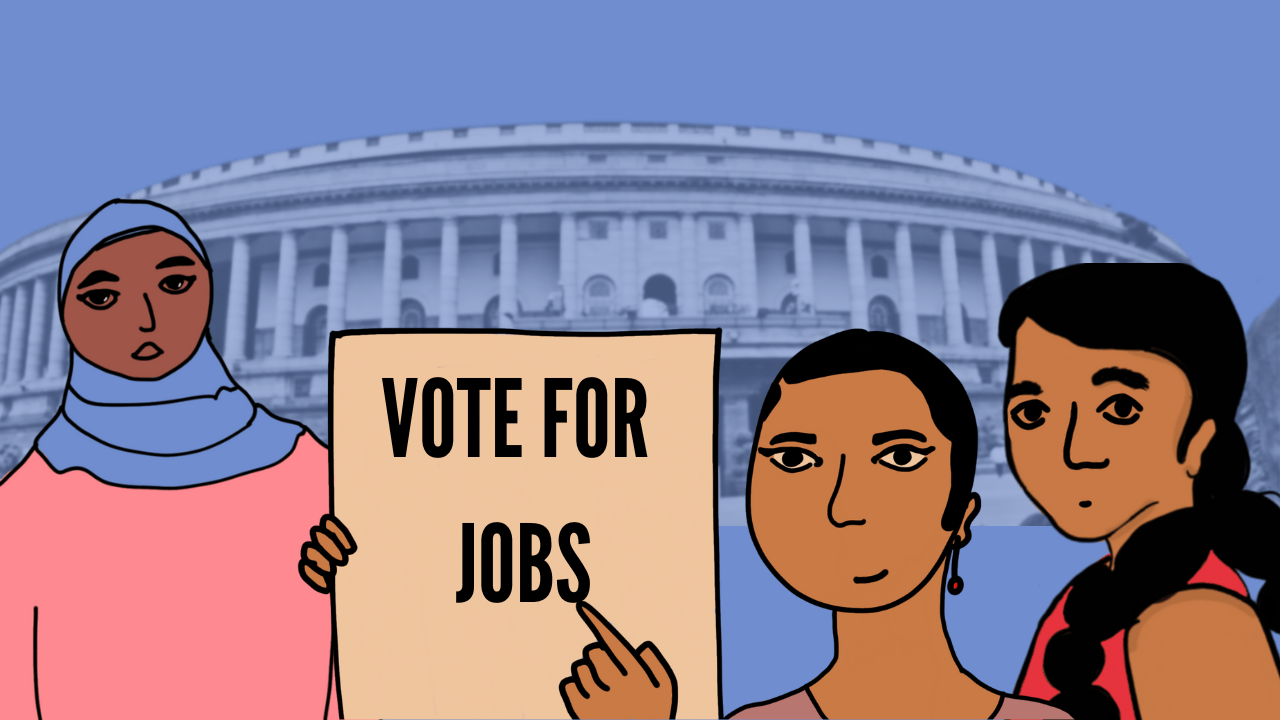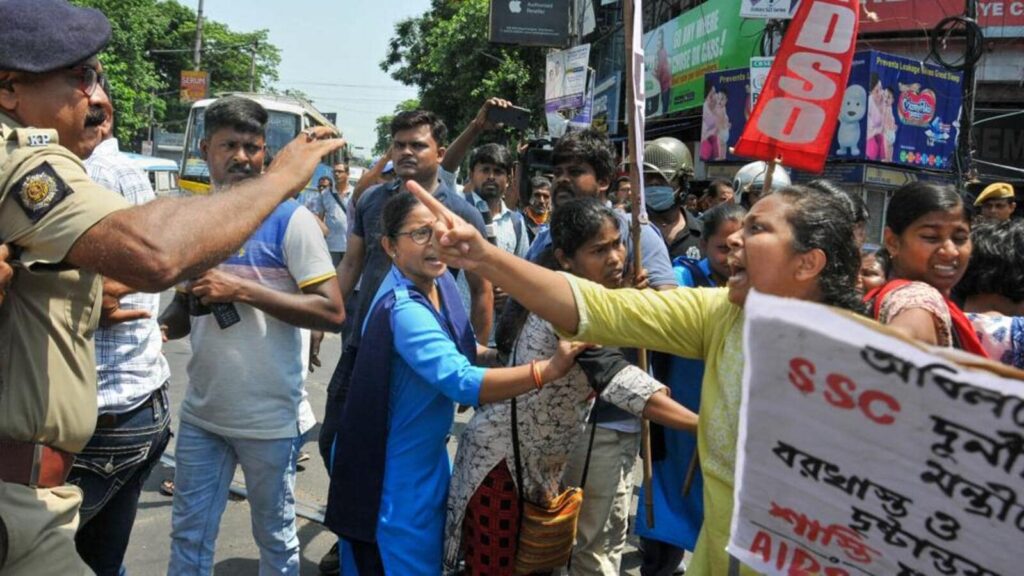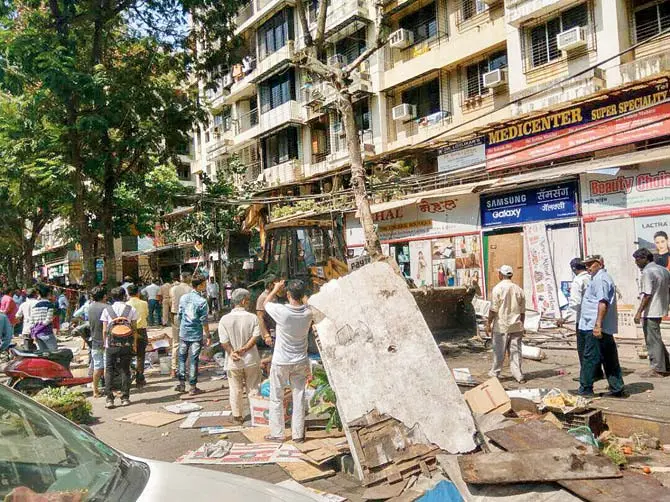In a landmark decision by the Calcutta High Court on 22nd April, the appointment of teaching and non-teaching staff in West Bengal Government funded and aided schools through the 2016 State Level Selection Test (SLST) has been cancelled. The process of their recruitment, that is the 2016 SLST, has been deemed invalid and the School Service Commission (SSC) has been asked to conduct fresh recruitments. All the teachers who had been recruited that year have been asked to return their salary in six weeks.
In a landmark decision by the Calcutta High Court on 22nd April, the appointment of teaching and non-teaching staff in West Bengal Government funded and aided schools through the 2016 State Level Selection Test (SLST) has been cancelled.
Since teaching, especially in government schools, is one of the few jobs that is deemed somewhat socially acceptable for women by the patriarchal society, the SSC teacher recruitment scam disproportionately affects women and marginalised genders, thereby jeopardising their attempt towards becoming financially independent. Without the stable government jobs and a steady income, most women would have no choice but to be forced into marriages following family pressure.
The truth behind the West Bengal School Service Commission (SSC) teacher recruitment scam was discovered after TMC leader Partha Chatterjee was arrested on July 23, 2022 after Rs 21 crore in cash and jewellery worth above Rs 1 crore was recovered from the Kolkata residence of Arpita Mukherjee, a close aide of the former education minister.
The SSC empanelled candidates had been protesting against the corruption in the TMC government, demanding their “legitimate” jobs.
The SSC teacher recruitment scam of 2016 led to several educated and deserving young job-seekers from West Bengal facing a cruel unemployment crisis. The SSC empanelled candidates had been protesting against the corruption in the TMC government, demanding their “legitimate” jobs. Despite facing police brutality and ridicule from the State Government, the students took part in sit-in demonstrations or ‘dharnas’ and rallied across the city to combat the state orchestrated unemployment crisis in West Bengal.
The SSC scams lay bare the festering corruption and greed within the ruling government, which has led to a crippling unemployment crisis in WB. While it affected youth from all demographics in West Bengal, women and queer identifying people bore the worst brunt of this crisis. Deprived of the “security” that a government job promises, they had to look for other income avenues where they might face greater discrimination and violence. Moreover, the stable income from a government job promises them agency and power, the absence of which can result in their rights being curbed and voices stifled within the sphere of the family itself.
Not limited to WB, itself: the current unemployment crisis is a national issue
Apart from the statewide unemployment crisis, what is more concerning for the youth of India today, is the national unemployment issue. According to the India Employment Report 2024 jointly published by the International Labour Organisation (ILO) and the Institute of Human Development (IHD), the proportion of educated young people, possessing at least secondary education, among the total unemployed youth has nearly doubled from 35.2 percent in 2000 to 65.7 percent in 2022. High dropout rates, withholding of minimum wage, low workforce participation and a widening gender gap in the labour market are all indicative of an economy that is currently battling the unemployment malady.
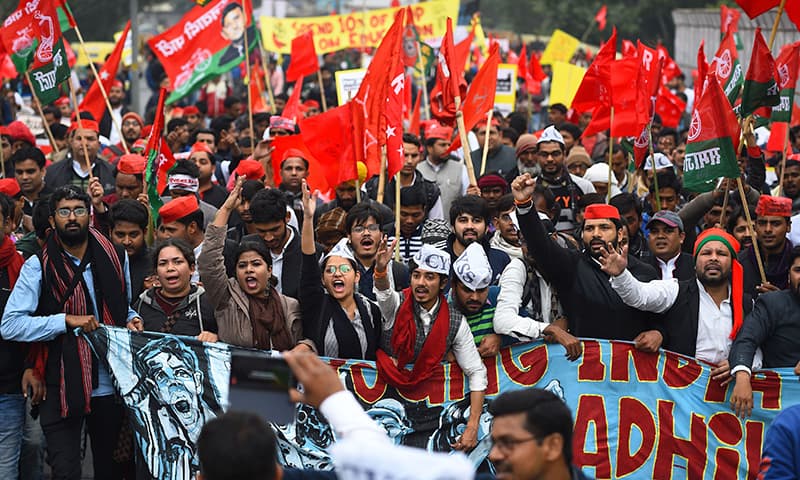
As we near yet another Lok Sabha election, the issue of unemployment becomes a crucial talking point in the electoral discourse, affecting the youth greatly, especially those coming from marginalised social positions and genders.
Students and job seekers speak on the unemployment crisis
Speaking about her concerns regarding the current situation, Mrittika Mallick, a final year Master’s student of English literature said, ‘It (the current unemployment crisis) is exhausting to begin with. It is hopeless and breeds a distaste for every little thing in life, achievements, hard work, quality time with family and friends. The thought of not being able to provide for myself at the right time and with a deserving/expected lifestyle haunts me in every little thing I do on a daily basis.’.
The sentiment that employment and stable income for the youth is not a priority of the ruling government was echoed by most students/job-seekers. While discussing the current unemployment problem in the context of the ongoing 2024 Lok Sabha elections, G*, a Jadavpur University alumnus who had completed their post graduation in 2023 said, ‘I think there is little to no concern given to the current unemployment crisis. The ruling party has not made it their priority. The economy has not recovered from the adverse effects of Covid-19, but even before, the recession was only a matter of time. The current government’s focus on religion and communal issues has rendered the average citizen myopic to a fault.’
Speaking about getting a job as a queer Muslim person, in the current political climate, G, the JU ex-student shared, ‘Personally, I think it will be very difficult to find a job, even if i were not a woman or queer. However, my identity as a woman, as a marginalised person, as a queer person, simply exacerbates those issues, to a point where I think it will be very difficult for me to continue to reside in this country.’
The placement cells, especially in the Humanities stream, have not been very helpful in securing me a suitable job after my post graduation
Mrittika Mallick, final year Master’s student.
Mrittika echoes similar sentiments, her frustration exacerbated by the fact that she faces this crisis despite studying from a premiere institution of the country: ‘The absence of any prospective work with a good pay that also does not compromise on the quality of life and work-life balance after 5 years of studying in a premier institute recognised nationally and internationally, says a lot about the little to nothing contributions the governments are making to invest in better job markets. The placement cells, especially in the Humanities stream, have not been very helpful in securing me a suitable job after my post graduation.’
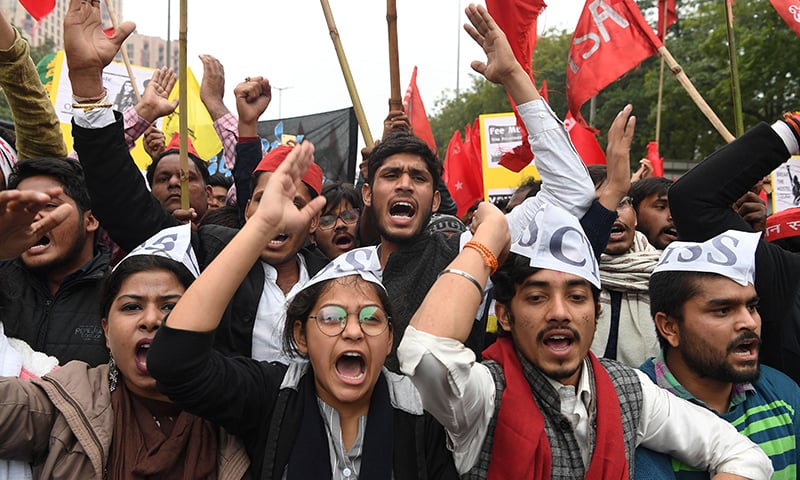
R*, a final year Masters student of Comparative Literature who identifies as queer, says, ‘The anxiety is real. As somebody who has studied Comparative Literature, I think I have to start with freelance content writing work after my Masters is done. There are very few workplaces which are inclusive and supportive of women and queer individuals. Places which do support marginalised genders are usually small-scale startups. The bigger, more reputed organisations refuse to accept freshers.’
Gender discrimination, communalism and queerphobia at work: exacerbating the unemployment crisis
Speaking to us about potential queerphobia in Indian organisations, R said, ‘I had applied for a position at a reputed Bengali news media house. In my application, I had mentioned my dead name and my preferred name. I think this could have been one of the reasons my application was rejected.’
SB*, a queer, non-binary person who has studied English and is currently employed through the placement cell of their University, adds to this, saying, ‘I believe the job market isn’t yet very sensitive about the issues of women/queer people. So often, we are addressed in ways that makes us uncomfortable. As a woman, who is also non-binary and queer, I can say that what I find most uncomfortable about workspaces is assumptions about my sexuality and gender. So, it creates a discomfort when I eventually have to fit into if I’m trying not to “out” myself. And often I end up avoiding having conversations about myself unless I can find a trustworthy friend. This makes most other conversations feel deceitful.’
As a woman, who is also non-binary and queer, I can say that what I find most uncomfortable about workspaces is assumptions about my sexuality and gender.
SB*
Mrittika agreed to the notion that there is inherent sexism and queerphobia within workplaces, exacerbated by the current political scenario. She further cites communalism and religious discrimination which might aggravate the unemployment crisis, especially in marginalised communities: ‘An added factor that could further marginalise the existing marginalised is that of communalism/religion. If the current majoritarian party continues to instill religious extremism in almost every sector of living, it won’t be very late until the professional spaces are also dictated by such religious fervor. I hope the upcoming elections do not enable this unwarranted prospect of merging education or work and religion. It would be terribly sad if the existing bad state of employment is further polluted by these strains.’
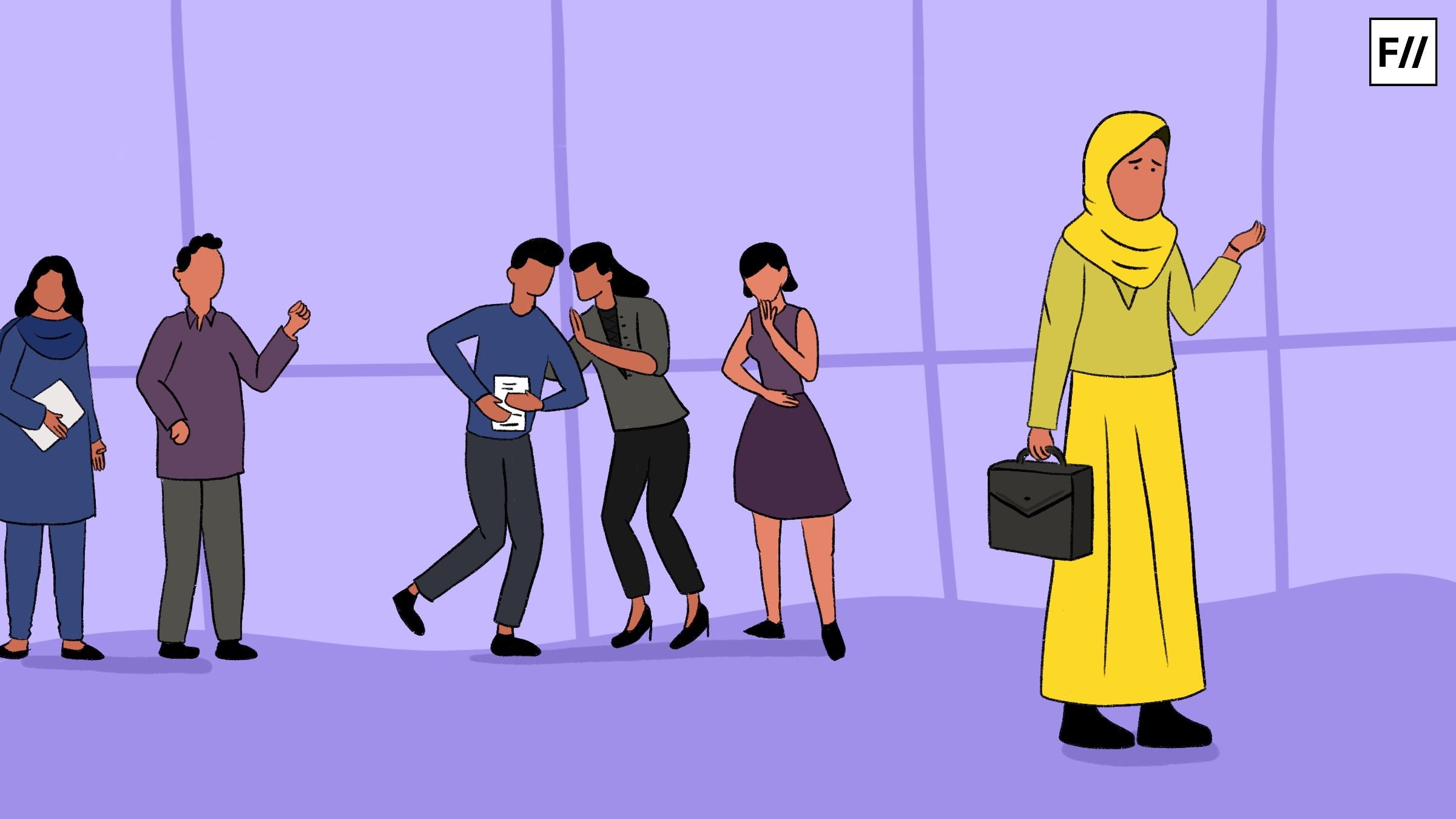
Adding to the conversation on the twin crises of unemployment and communalism, G said, ‘The government should focus less on communal issues and more on repairing the broken job market. Unemployment amongst the youth is reaching an all-time high, and the sitting government has decided to divert the attention of the public to focus on communal division.’
Reflecting on the unemployment crisis as a queer person who has studied Humanities, SB says, ‘I can say this from the perspective of a queer person who has studied arts which means there are very few marketable skills that I possess. But I believe the same is also applicable to my friends who have studied subjects like Mathematics and Law. It’s hard to find a good internship that isn’t trying to exploit you. And then it is harder to find a job with the experience you have because again, there are many people applying for the positions. So I think what the government can do is make a job/internship portal for queer/women University students. And also, I believe there’s a lack of a network of supporting individuals when it comes to finding a job. So, maybe a database can be built where queer/women individuals from different professions put their contact and work info so that freshers can reach out to them for whatever help they might need.’
Reiterating this point, R* identifies how students with Master’s degrees are finding it difficult to get jobs and have no other options but to provide private tuitions which are usually low paying.
Reiterating this point, R identifies how students with Master’s degrees are finding it difficult to get jobs and have no other options but to provide private tuitions which are usually low paying.
Possible solutions: what can be done to address rising unemployment in India?
The respondents were unanimous in their verdict that immediate attention should be given to the crisis of joblessness, by the party that comes into power after the 2024 Lok Sabha elections. While R suggested having a government website containing a field-wise consolidated list of job opportunities in the state, national and international level, penalising gender and queerphobic discrimination in the workplace strictly and better, more practical and accessible career counseling and guidance workshops funded by the government instead of private firms which charge exorbitant fees, SB says, ‘We need a mandatory course where university students can learn how to speak and write English correctly. It’s only within a few departments like English that people can converse fluently in English. But in the job market, and also in general, it’s very important that everyone knows how to speak/write English with confidence.’
Mrittika feels that there is an urgent need for the government and employers to understand that ‘marginalised people also share the same skills and motivations required to qualify for available positions.’
In order to make the job market more women and queer friendly, she suggests to ‘create awareness programs for such individuals and educate them on available scholarships and funds that can be granted to them for higher education and better opportunities, leading to applying for good jobs.’ She adds, ‘Lack of such educational measures have made me miss out on certain scholarships, which could have helped me support myself financially for seeking better, larger opportunities.’
The projected winner of this Lok Sabha elections has not shown any inclination towards increasing employment amongst the youth.
G*, Jadavpur University alumnus who had completed their post graduation in 2023.
At the government level, Mrittika calls for the parties in power to ‘Include more women and queer individuals in policy making programmes. Increase awareness programs and encourage leaders to speak up openly on such matters on live programmes and televisions. The marginalised need employment as well as places in politics to bring even a drop of change.’
Looking ahead: the 2024 Lok Sabha elections and the crisis of unemployment
When asked about the hopes the respondent students/job seekers have for the 2024 Lok Sabha elections, there was a collective sense of disappointment and frustration. ‘Things are going to go south if the BJP wins again. Therefore, I have no expectations from their shrewd and tokenistic politics of hate,’ says R.
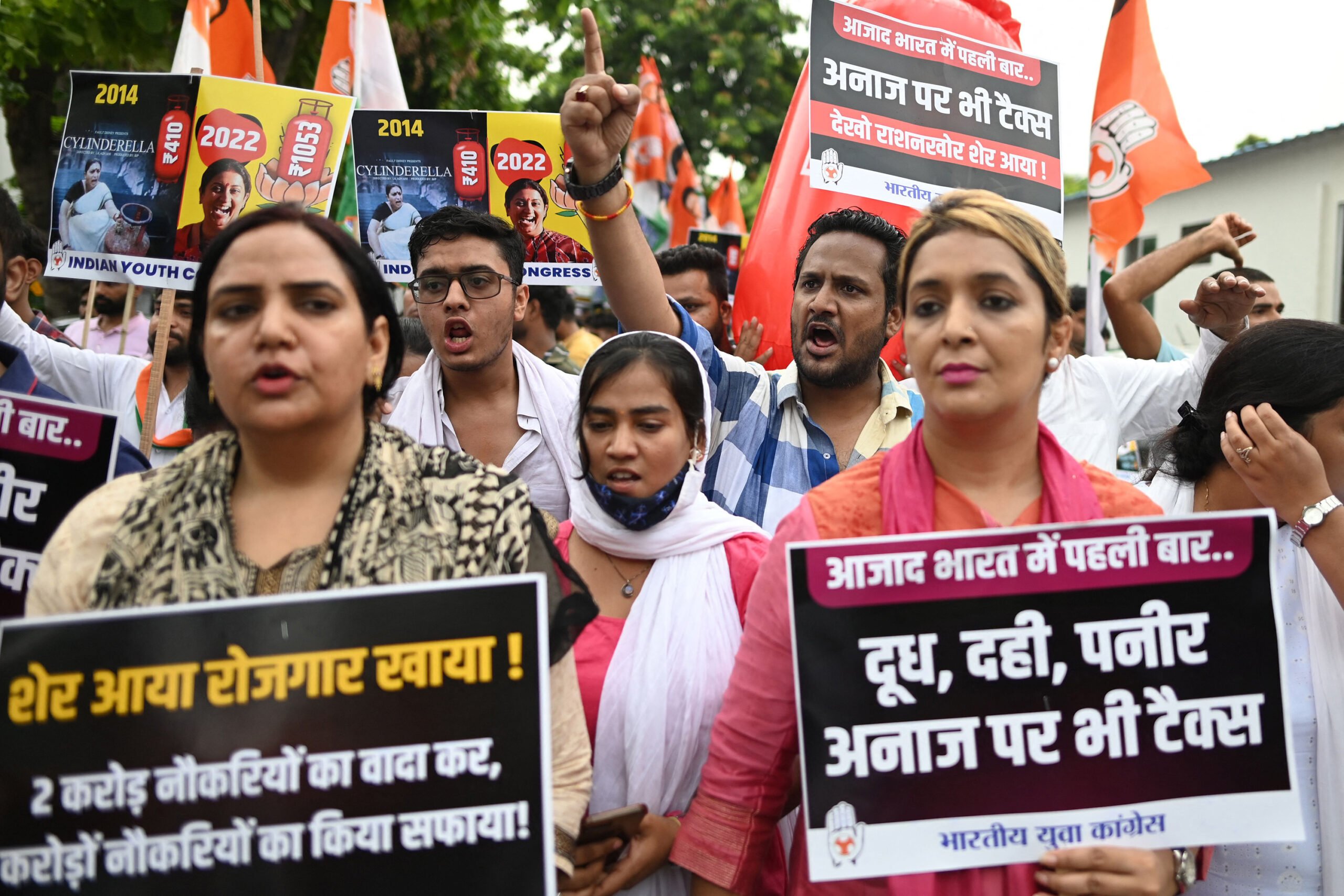
As a queer Muslim person, G echoes this sentiment. ‘The projected winner of this Lok Sabha elections has not shown any inclination towards increasing employment amongst the youth. There are no social protections for the elderly. The largest state-funded infrastructure system (The Railways) is at risk of being privatised. The future ahead is very bleak.’ Says G.
*Names have been kept confidential to protect identity
About the author(s)
Ananya Ray has completed her Masters in English from Jadavpur University, Kolkata, India. A published poet, intersectional activist and academic author, she has a keen interest in gender, politics and Postcolonialism.
